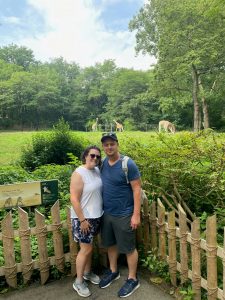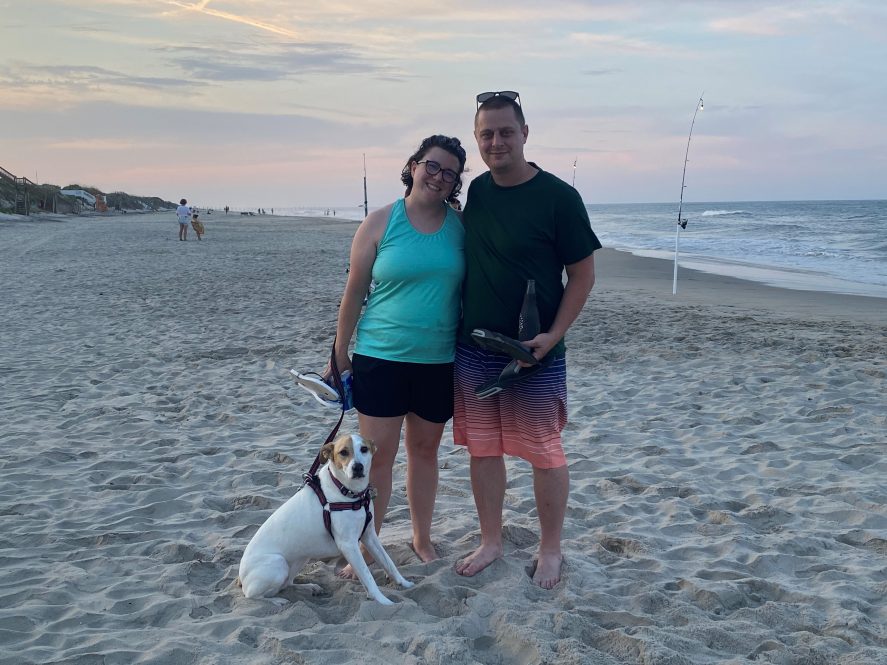Women under 40 years old may feel they are not at risk for breast cancer, but 5% of all cases happen in this age group.
Jennifer Skitromo never thought that at age 34, and with no family history, that breast cancer was something she needed to be concerned about.
She started having extreme fatigue and some weight gain and her primary care practitioner indicated that she may have mononucleosis or “mono.” The weight gain and fatigue continued and she started to have breast soreness and nipple discharge.
After a conversation with her sister, she realized this was not normal, especially since she had never had children and breastfed.
Symptoms of breast cancer can include:
- A lump or mass in the breast
- Swelling of all or part of the breast, even if no lump is felt
- Skin irritation or dimpling
- Breast or nipple pain
- Nipple retraction (turning inward)
- The nipple or breast skin appears red, scaly, or thickened
- Nipple discharge

That evening she did a self-exam and felt a lump. Nearly 80% of young women diagnosed with breast cancer find their breast abnormality themselves. She had not been to her OB/GYN for a few years and called the next morning to explain what was going on. They got her right in and she had her first mammography, breast ultrasound, and biopsy completed.
The initial biopsy was inconclusive, and in February 2019 she had a lumpectomy performed by Dr. Dana Scott, assistant professor, Department of Obstetrics and Gynecology specializing in breast diseases and cancer genetics at UConn Health. Her cancer was diagnosed and she was referred to Dr. Susan Tannenbaum, chief of the Division of Hematology and Oncology in the Department of Medicine and the clinical director of the Carole and Ray Neag Comprehensive Cancer Center at UConn Health.
“Dr. Tannenbaum is a straight shooter – she tells it like it is and I was so grateful for that,” says Skitromo. “I’m the type in these situations to put emotions aside and look at what do we have to do to get things done.”
Breast cancer in young adults has unique challenges. They are at a different phase in their lives and encounter unique challenges compared to older persons. These challenges may significantly impact the quality and length of life.
Some of the unique challenges and issues young adults may face:
- The possibility of early menopause and sexual dysfunction brought on by breast cancer treatment
- Fertility issues, because breast cancer treatment can affect a woman’s ability and plans to have children
- Many young women are raising small children while enduring treatment and subsequent side effects
- Young breast cancer survivors have a higher prevalence of psychosocial issues such as anxiety and depression
- Questions about pregnancy (whether it is safe or possible) after diagnosis
- Heightened concerns about body image, especially after breast cancer-related surgery and treatment
- Whether married or single, intimacy issues may arise for women diagnosed with breast cancer
- Challenges to financial stability due to workplace issues, lack of sufficient health insurance, and the cost of cancer care
Skitromo and her husband attempted fertility preservation prior to her chemotherapy, but it did not work out for them. They are okay with that and she enjoys being an aunt to her niece and nephew and working with her students as a school counselor for teenagers.
She started chemotherapy after returning from an already planned cruise. During her chemotherapy she continued to work, taking off her chemo days on Thursdays and the following Mondays. She insisted she was going to do everything she had done prior to this diagnosis.
She cut off all her hair and colored it fun colors before she finally shaved it and chose to be “bald and beautiful” throughout her treatments.
Following chemotherapy treatments, she followed up with radiation. “The radiation techs were so great, they were funny and made me feel comfortable,” says Skitromo.
Skitromo was blessed to have a supportive husband and family with her through her treatments as well as co-workers and work environment that were accommodating and compassionate. She projected so much confidence and so did her team at UConn Health that her husband was never afraid of her dying.
She now continues with ongoing therapies, treatments and procedures for the next few years. Scott still follows her for both GYN care and other cancer survivor issues unique to young breast cancer patients like her.
There are several factors that put a woman at higher risk for developing breast cancer, including:
- A personal history of breast cancer or a high-risk lesion found by biopsy
- A family history of breast cancer, particularly at an early age
- A family history that is concerning for a genetic syndrome that may put them at a higher risk for breast cancer (breast cancer diagnosed before age 50, ovarian cancer at any age, triple-negative breast cancer, bilateral breast cancer, male breast cancer, pancreatic cancer or metastatic prostate cancer)
- History of radiation therapy to the chest
- A known genetic mutation conferring a high risk for the development of breast cancer
- Ashkenazi Jewish ancestry (one in 40 Ashkenazi Jews carry mutations in BRCA1 or BRCA2)
Measures that all women can take to reduce breast cancer risk include:
- Achieving and maintaining ideal body weight
- Limiting alcohol consumption
- Getting regular exercise
- Breastfeeding
That being said, if breast cancer does develop, early detection and prompt treatment can significantly increase a woman’s chances of survival. More than 90% of women whose breast cancer is found in an early stage will survive.
Led by Scott, the UConn Health and Neag Comprehensive Cancer Center High Risk Program has continued to grow and develop over the last year. It is a collaborative effort with the breast cancer team and the cancer genetic counselors, Jennifer Stroop, MS, LGC and Connor Linehan, MS, LGC, who are instrumental in identifying patients appropriate for referral. Currently, the program focuses on providing focused, expert care to patients at high risk for breast and gynecologic malignancies due to their family history, genetic mutation, or prior health history. The ultimate goal is to decrease the morbidity and mortality of cancer through personalized risk assessment and individualized management plans for screening and risk-reducing surgery. Patients are counseled extensively on their individual risk assessment, and guided through their options for cancer screening and risk-reducing surgery. This program helps to make a high risk “home”, where Scott manages patients’ screening imaging and performs their risk-reducing gynecologic surgeries.
If you are concerned about your breast health or need a mammogram, visit UConn Health Women’s Center, UConn Health Carole and Ray Neag Comprehensive Cancer Center, or schedule your mammogram online or by calling 860-679-3634.



